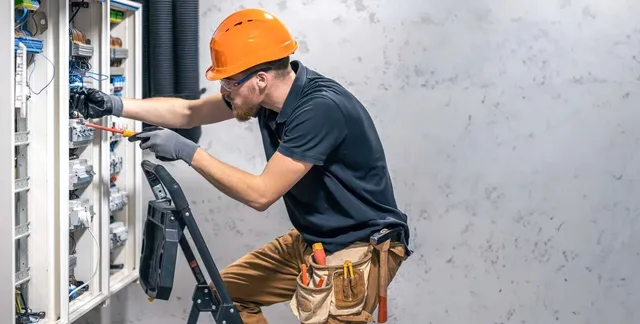What You Need to Know Before Hiring an Electrical Expert for Your Home or Business

When it comes to the functionality and safety of your home or business, electrical systems play an essential role. Whether you’re remodeling a kitchen, upgrading a commercial space, or fixing faulty wiring, working with electricity is not something to take lightly. Even minor issues can quickly escalate into serious hazards if handled improperly.
That’s where professionals come in. If you’re considering electrical work—large or small—you’ve likely come across the term electrical contractor. But what exactly does it mean, and how do you choose the right one for your project?
In this comprehensive guide, we’ll explore what electrical contractors do, the services they offer, when to hire them, and the factors to consider when selecting the right professional for the job.
Understanding the Role of an Electrical Professional
At first glance, it may seem like an electrician and an electrical contractor are the same. While there is overlap, there are key distinctions:
- An electrician is a tradesperson trained to install, maintain, and repair electrical systems.
- An electrical contractor is a business entity or individual licensed to perform electrical work, often employing multiple electricians.
In other words, the contractor is the organizer, supervisor, and legal party responsible for delivering electrical services—whether residential, commercial, or industrial. They are often the ones who manage the permits, coordinate teams, and ensure that all work complies with local codes and safety regulations.
Common Services Offered
Electrical contractors handle a wide range of services, many of which go far beyond simple repairs. Here’s a breakdown of the most common types of projects they manage:
1. Residential Electrical Services
- Installation of lighting fixtures and ceiling fans
- Rewiring older homes
- Upgrading electrical panels or circuit breakers
- Installing generators or solar systems
- Smart home automation and system integration
2. Commercial Electrical Services
- Designing and installing power systems for office buildings, retail spaces, and restaurants
- Emergency and backup power solutions
- Network cabling and data system integration
- Lighting design, including energy-efficient upgrades
- Maintenance of fire alarms and security systems
3. Industrial and Specialized Work
- Complex control systems and machinery wiring
- High-voltage installations and safety assessments
- Electrical system audits
- Compliance inspections and maintenance scheduling
These projects require strict adherence to safety codes, professional certification, and often collaboration with other contractors such as builders or engineers.
When to Hire an Electrical Contractor
There are certain situations where hiring a qualified contractor is not just smart—it’s essential. Here are some clear signs you need expert help:
1. You’re Starting a Major Renovation
Any major home or commercial renovation that includes walls being torn down, new rooms added, or major systems relocated will require electrical system updates.
2. Your System Is Outdated
Older homes and buildings often have outdated wiring that can’t handle modern electrical loads. Upgrades not only improve functionality but reduce the risk of fire and system failure.
3. You’re Experiencing Regular Electrical Issues
Frequent circuit trips, flickering lights, or power surges can be signs of deeper issues in your system. An electrical contractor can diagnose the root cause and provide safe, lasting solutions.
4. You Need to Comply with Building Codes
Any time you’re required to pull a permit or pass an inspection, working with a licensed contractor ensures that the work meets current standards and codes.
The Importance of Licenses and Certifications
Before hiring anyone to work on your property’s electrical systems, make sure they are properly licensed and insured. A licensed electrical contractor has gone through rigorous training, testing, and certifications to ensure they meet legal and safety standards.
In addition to licensing, look for the following:
- Insurance and bonding: Protects you in case of accidents or damage during the job.
- Permits: Contractors often handle this on your behalf, ensuring legal compliance.
- Warranties or service guarantees: Indicate the contractor stands by their work.
Always verify these details with documentation. Trustworthy contractors won’t hesitate to provide them.
Choosing the Right Contractor for Your Project
Selecting the right contractor is as critical as the work itself. Here are key factors to consider:
1. Experience and Specialization
Not all contractors specialize in the same type of work. Make sure the one you hire has proven experience with projects similar to yours—whether residential, commercial, or industrial.
2. Reputation and Reviews
Online reviews, word-of-mouth recommendations, and testimonials offer valuable insights. Look for feedback about punctuality, communication, problem-solving, and quality of work.
3. Clear Communication
A good contractor explains your options clearly, provides accurate timelines, and communicates transparently about costs, changes, or unexpected issues.
4. Transparent Pricing
Ask for a written estimate that breaks down costs for materials, labor, and any extra fees. Be cautious of quotes that are significantly lower than others; they may indicate a lack of experience or hidden costs.
5. Availability and Reliability
The best contractors often have packed schedules, so plan ahead. However, once a project is underway, they should be dependable, show up on time, and stick to the agreed timeline.
Cost Considerations: What to Expect
The cost of hiring an electrical contractor depends on multiple factors, including:
- Type and scope of the project
- Size of the property
- Materials required
- Labor hours involved
- Emergency or after-hours work
For small jobs like fixture installations or outlet repairs, pricing may range from $100–$300. Larger projects such as rewiring a home or upgrading a commercial electrical system can run into the thousands. Always get multiple quotes and ensure everything is detailed in the contract before work begins.
Safety Comes First
Electrical work involves significant risk if not handled correctly. From electrocution and fire hazards to overloaded circuits and failed inspections, the consequences of DIY electrical work or hiring unqualified help can be severe.
Working with a certified electrical contractor ensures that your systems are not only functional but safe for years to come. These professionals adhere to strict codes, use the correct tools, and are trained to anticipate problems that a layperson might miss entirely.
Trends in the Electrical Industry
The world of electrical work is evolving quickly. Smart homes, sustainable energy, and advanced automation are shaping how contractors approach modern installations. Some emerging trends include:
- Energy-efficient upgrades: Including LED lighting, smart thermostats, and occupancy sensors
- Electric vehicle (EV) charging stations: Increasingly common in both homes and workplaces
- Home automation systems: Integrated lighting, security, and entertainment control systems
- Battery storage systems: For homes using solar power
By hiring a contractor who keeps up with these trends, you ensure your home or business is future-ready.
Final Thoughts
Electricity powers everything from your lights and appliances to your computers and air conditioning. As such a critical part of your home or business, it deserves expert attention. Whether you’re installing, repairing, or upgrading electrical systems, choosing a qualified electrical contractor gives you peace of mind, safety, and reliability.
Don’t compromise when it comes to electrical work. A well-chosen professional will ensure that your systems are efficient, up to code, and tailored to your specific needs. From small fixes to large-scale installations, the right help makes all the difference.




